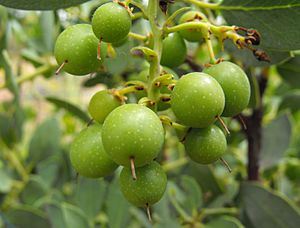Rainbow manzanita facts for kids
Quick facts for kids Rainbow manzanita |
|
|---|---|
 |
|
| unripe fruit | |
| Conservation status | |
| Scientific classification |
|
| Kingdom: | Plantae |
| Clade: | Tracheophytes |
| Clade: | Angiosperms |
| Clade: | Eudicots |
| Clade: | Asterids |
| Order: | Ericales |
| Family: | Ericaceae |
| Genus: | Arctostaphylos |
| Species: |
A. rainbowensis
|
| Binomial name | |
| Arctostaphylos rainbowensis J.E.Keeley & A.Massihi
|
|
| Script error: The function "autoWithCaption" does not exist. | |
Script error: No such module "Check for conflicting parameters".
The Rainbow manzanita (scientific name: Arctostaphylos rainbowensis) is a special type of manzanita plant. It grows only in California, specifically in parts of northern San Diego and southern Riverside Counties. You can find it in the Peninsular Ranges.
This plant gets its name from a place called Rainbow, California. It grows a lot near there, especially in the chaparral areas of the Santa Ana Mountains. It's often the only manzanita you'll see in these areas.
Contents
Discovering the Rainbow Manzanita
How Scientists Found It
Scientists first collected a sample of this plant in 1973. At first, they thought it might be a type of Arctostaphylos peninsularis. They also wondered if it was a mix of two other manzanita species. These were Arctostaphylos glauca and Arctostaphylos glandulosa.
Naming a New Species
After studying the plant carefully, scientists realized it was different. They used special methods to compare its features. Both ideas about it being a known species or a hybrid were proven wrong. So, in 1994, they officially named it a brand new species.
What Does Rainbow Manzanita Look Like?
Size and Bark
The Rainbow manzanita is a shrub that grows upright. It can be as short as 1 metre (3.3 ft) (about 3 feet) or as tall as 4 metres (13 ft) (about 13 feet). It has a special woody lump called a burl at its base. Its bark is smooth and has a reddish-brown color.
Leaves and Flowers
Its leaves are oval-shaped. They can be up to 5 centimeters (about 2 inches) long. They are also up to 3.5 centimeters (about 1.4 inches) wide. The leaves are smooth and feel a bit waxy.
The plant's flowers grow in hanging bunches. Each flower is shaped like a small urn. They are white and measure about 6 to 8 millimeters (about 0.2 to 0.3 inches) long.
Fruit
After the flowers, the plant produces fruit. The fruit is about 1 centimeter (about 0.4 inches) wide. When it ripens, it turns a dark purple-brown color.
Protecting the Rainbow Manzanita
Why Some Plants Are Gone
Since this plant was first found, its natural home has changed a lot. Many areas where it used to grow have been developed. This development has caused some groups of these plants to disappear completely from their original spots.
Helping the Species Survive
It's important to protect the remaining areas where Rainbow manzanita grows. This helps make sure this unique California plant can continue to thrive for future generations.
 | Misty Copeland |
 | Raven Wilkinson |
 | Debra Austin |
 | Aesha Ash |


